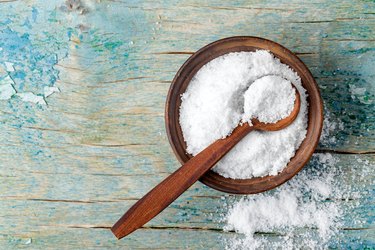
Should you have high creatinine, diet alterations must be implemented, as heightened creatinine levels could be a sign of kidney disease. Avoiding too much protein and adding fiber to your diet can help manage creatinine levels.
What is Creatinine?
Video of the Day
Creatine is what forms when protein is converted into energy through metabolization. When creatine is broken down, it becomes creatinine, a waste product which your kidneys take out of your blood and excrete through your urine, says HealthlinkBC. If you have kidney disease, the amount of creatinine in your blood increases, while the level in your urine decreases.
Video of the Day
There are a few types of tests you can do to determine whether your creatinine levels are too high. You can test your blood creatinine level, which shows how well the kidneys are functioning. A high level may be a sign that your kidneys are not functioning as they should.
A creatinine clearance test, on the other hand, will better test how well your kidneys are working. It's done both through a blood and urine sample. Finally, there's the blood urea nitrogen-to-creatinine (BUN) test, which determines the amount of urea in your blood. The blood creatinine levels and blood urea nitrogen, will help you find the BUN-to-creatinine ratio.
High Creatinine Diet
If you're experiencing high creatinine symptoms, such as nausea and loss of appetite, you may need to alter your diet, in addition to paying a visit to your doctor. Eating large amounts of protein, such as meat, fish, chicken, eggs, cheese, milk and yogurt can affect creatinine buildup, says Beaumont Hospital Kidney Centre. Therefore, those with high creatinine should seek dietary advice on how much protein to consume as too much protein can be detrimental.
While protein should be avoided for those on a high creatinine diet, studies have found that fiber should be consumed more regularly. One March 2013 study in the Journal of Renal Nutrition with a small sample size of 13 chronic kidney disease (CKD) patients, found that increasing fiber intake in CKD patients through consuming foods with added fiber, can reduce serum creatinine levels.
If high creatinine levels lead to kidney failure, there's a list of foods and nutrients you'll need to avoid, according to NIH: National Institute of Diabetes and Digestive and Kidney Diseases. Nutrients and substances you may need to limit, include:
- Water, as too much water can cause swelling, high blood pressure or overwork your heart.
- Sodium, which can cause high blood pressure.
- Protein, which can cause creatinine buildup.
- Phosphorus, as too much can weaken your bones.
- Potassium, which, in high levels can affect the brain and nerve cells.
Treatments for Kidney Disease
Creatinine buildup is one indication of kidney disease, which is when your kidneys are damaged and not properly filtering your blood, says Better Health Channel. Symptoms may include a change in frequency and quantity of urine, changes in the appearance of your urine, blood in your urine, puffiness around your legs and ankles and high blood pressure.
Kidney disease treatment, or high creatinine treatment, might include diet and medication changes if the disease is detected in its early stages. However, if kidney function falls below 10 percent of "normal", treatment includes dialysis or kidney transplant. Dialysis filters the blood, removing waste products and extra water.
As for kidney disease prevention, Better Health Channel recommends healthy lifestyle changes that include eating lots of fruit and vegetables, as well as grain-based food, such as bread and rice, consuming lean meats every week, cutting down on salty or fatty foods, drinking plenty of water, staying fit, limiting alcohol and avoiding stress.
- Beaumont Hospital Kidney Centre: "Dietary Advice For Kidney Patients"
- Better Health Channel: "Kidney Disease"
- Journal of Renal Nutrition: "Foods with Added Fiber Lower Serum Creatinine Levels in Patients with Chronic Kidney Disease"
- MedlinePlus: "Creatinine"
- NIH: "Eating Right With Kidney Failure"
- HealthLinkBC: "Creatinine and Creatinine Clearance"